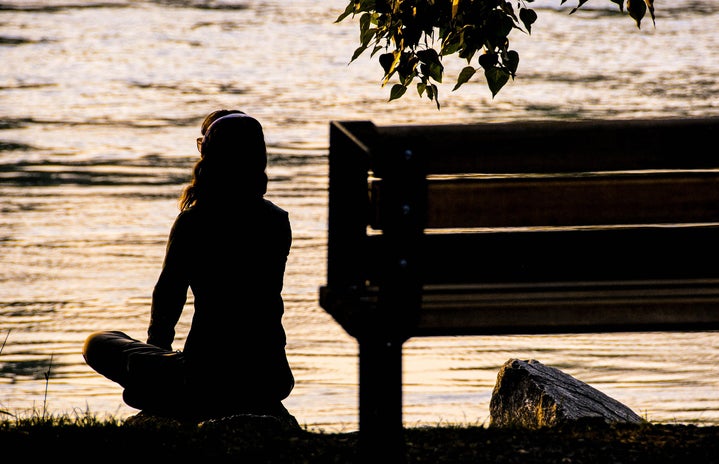“All things must come to an end” is an unmistakable fact of life. If you’re like me, you want things to end as neatly and gently as possible. You hate the idea of unresolved conflict, potential enemies, and the thought that someone out there might think poorly of you. In short, if you’re like me, you seek closure in life.
It’s a commonly accepted idea that in situations involving loss, or the end of something, closure helps us move on. Closure seems to come up most often when we talk about grief; from breakups to actual deaths, we say that the person experiencing loss needs to find a way to get closure. But what is closure? Is it always attainable? After undergoing a period of loss in my life, I think I am finally beginning to understand what closure actually is.
It took me multiple defeats, situations where I fell flat on my face to understand that if someone wants to leave, I need to let them. If someone is making an attempt to leave, regardless of the reason – whether they’re trying to get me to ask them to stay, whether it’s because they don’t want to leave but feel they have no choice – it doesn’t matter. If someone makes any attempt to leave, just let them. Not everyone is meant to stay. How do we know who’s meant to stay and who’s meant to go? Well, for one, if they’re supposed to stay, you shouldn’t have to be begging them to. For another, in situations where you feel discarded, where you wonder whether someone ever even valued you, it probably means they were always meant to leave. It was a matter of when, not if.
Closure can be a beautiful thing. The feeling that came with the few times in my life that I received unmistakable closure from another person was revitalizing. It was a blend of utter shock, sorrow, and a wave of pure relief. Those moments allowed me not only to move on, but to look back on those people and the time I spent with them with nothing but gratitude. However, I want to emphasize that, in my experience, this is very rare. Not everyone will give you closure; most people won’t. It sucks to think about the fact that sometimes closure is seeing the other person, asking questions that have been left unsaid, or closing a chapter once and for all – but that person doesn’t want to see you or can’t. The great thing and awful thing is that you can only control your own actions. If they won’t give you closure, you will have to find that for yourself.
When you begin respecting and prioritizing yourself, people who find that intimidating will start to weed themselves out of your life. They may paint you as a monster, or as a helpless victim that “deserves better” than them. While it’s easier said than done, your life will take a turn for the better the day you understand that not everyone is going to love you. Not everyone will even like you. That is okay. The only person whose opinion of you always matters is your own. Realizing this and trying your best to truly believe it is the first step to giving yourself closure. I admit it still burns me a bit to think about people I’ve loved and lost, both romantically and platonically; it burns me even further when I think of the well wishes I’ve sent towards people who’ve made it clear they wish the worst for me. The good thing about closure (and the thing people seem to forget) is that it’s not always a single moment that helps you move on. It can be a process, a personal journey you undergo alone.
Another ideal that’s more easily said than done is that even if you end up losing someone on awful, irreparable terms, if you stayed true to yourself, you won’t regret it in the long run. I can look back at every experience in my life and say with confidence that at that time, I thought I was doing what was best. Was I always right? Of course not. Did I and whoever else was involved get out completely unscathed? Obviously not. But the only way to live without regret is to know that you did your very best with what you knew then. Maybe you were wrong, but at least you know better now. Maybe you and someone else both got hurt, but at least you can say that you didn’t intentionally hurt anyone.
So, if you find yourself in a situation where you feel the need for closure, but know you won’t get it from the other person, what then? What happens if you just don’t get any closure at all? The worst thing you can do in this situation is try to just forget and move on. One of my closest friends received no closure from her ex when they broke up and just tried to grit her teeth and move past it, but forcing yourself to move on without closure is not the same as giving yourself the closure you need. Those emotions you repress when you force yourself to “get over it” won’t stay buried forever. And just when you think you’re fine and you’ve gotten past what happened, the smallest setback will put you right back where you were all those months or years ago when things had just ended. Feel your sorrow. Mourn the loss of someone who once meant something to you. Be angry at them. Be angry at yourself. Then, when you’ve exhausted yourself, when you’ve journaled countless times and talked your closest confidants’ ears off, take real action. Ask yourself what this person and this experience was trying to teach you. If there’s something still bothering you about the loss, pinpoint it. If it was the intimacy, open up and foster your other relationships that have the potential for closeness. Meet new people, put yourself out there, and do not, under any circumstances, take this loss as a sign to stop striving for human connection.



